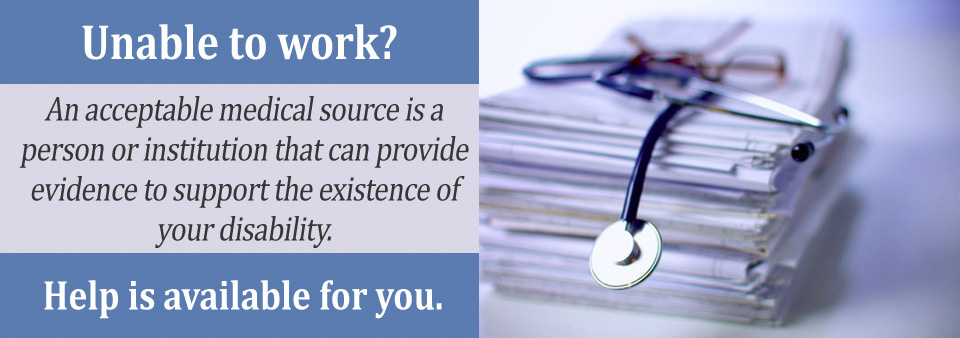In order to qualify for Social Security Disability benefits, your medical records must be assembled and submitted from all your acceptable medical sources. An acceptable medical source is a person or institution that can provide evidence to support the existence of your disability. Such evidence must be in accordance with the guidelines set forth by the Social Security Administration in its publication"Disability Evaluation Under Social Security", which is also known as the "Blue Book."
The Blue Book contains information on all medical conditions that the SSA considers as potentially disabling and for which you may receive Social Security Disability benefits. In connection with establishing the existence, duration, and severity of a disabling condition, each listing includes medical reports that must be submitted to the SSA by an acceptable medical source.
Examples of Acceptable Medical Sources:
- physicians (medical and osteopathic doctors, including psychiatrists)
- psychologists
- optometrists
- podiatrists
- speech-language pathologists
Examples of Acceptable Medical Reports:
- medical history
- clinical findings
- laboratory findings
- diagnoses
- treatment history, including response to treatment and prognosis of outcome
- statement of residual function,

Residual Functional Capacity
Residual Functional Capacity is, a statement that details what you can do despite your disabling condition and what you cannot do because of your disabling condition. Examples include:
- Physical disability: Your ability to do work-related activities such as sitting, standing, walking, lifting, carrying, handling objects, hearing, speaking, and traveling;
- Mental disability: Your ability to understand, remember instructions, carry out tasks, and respond appropriately to supervision, co-workers, and work pressures;
- Childhood disability: If the disabled person is a child, the child’s ability to function compared to children of the same age who do not have the child’s disability, specifically in acquiring and using information, attending and completing tasks, interacting and relating with others, moving about and manipulating objects, and caring for himself or herself, as well as the child’s health and physical well-being;
Start Your Application Today
To qualify for Social Security disability benefits, you will also need to ask for medical records from all health facilities where you have been treated.
Evidence can also be gathered from other acceptable sources, including:
- medical personnel such as nurse practitioners, physicians' assistants, naturopaths, chiropractors, audiologists, and therapists;
- educational personnel such as teachers, counselors, early intervention team members, developmental center workers, and daycare center workers;
- public and private social welfare agency personnel;
- other non-medical sources such as spouses, parents and other caregivers, siblings, other relatives, friends, neighbors, and clergy;
The evidence from all sources must be complete and detailed in order for you to qualify for Social Security Disability benefits. Your medical records as a whole must establish the nature of your disability, how long it is expected to last, and your ability to function in spite of this disability. Once the existence of a disabling condition is established, all the medical and non-medical evidence is considered in assessing its severity.
In assessing a claim for disability benefits, the SSA prefers records from “treating sources,” that is, those medical professionals who are actively engaged in the treatment of your condition over time, rather than those medical professionals who may have seen you on a limited basis, such as during a brief hospitalization or a one-time examination.
This is because a long-term relationship allows the treating professional to give medical evidence that tracks the development and course of your disability over time.
With credible medical sources that support your claim, your odds of being approved for benefits can increase significantly. With the help of your medical providers and an experienced attorney, your odds of a successful claim improve significantly as well. The Blue Book is a very technical publication which was written for professionals in the disability field as well as medical providers.
Because of the terminology used, you may have difficulty understanding its content and how it discusses acceptable medical sources. Don’t hesitate to talk with your doctor or a lawyer regarding the matter.